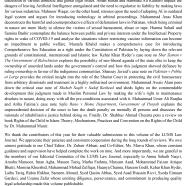
For almost a decade now, LUMS Law Journal has been the leading platform for annually publishing pertinent legal scholarship in Pakistan. It retains its higher academic and research standards in welcoming entries on wide range of legal issues from domestic to national and transnational ones. Continuing the tradition, this year, we are delighted to present the ninth volume of the LUMS Law Journal.
This volume contains five research articles, four case notes, and a book review, which entail research-based discussion of various domestic and global legal issues. Aman Rehan and Hammad Ali Kalhoro unpack the dangers of leaving Artificial Intelligence unregulated and the need to regularise its liability by making laws for various industries. Mahnoor Waqar, on the other hand, stresses upon the need of adopting AI in outdated legal system and argues for introducing technology in arbitral proceedings. Muhammad Anas Khan deconstructs the harmful and counterproductive effects of defamation laws in Pakistan, which being criminal in nature are more likely to silence the victims of sexual harassment, abuse or rape. Humna Sohail and Samina Bashir contemplate the balance between public and private interests under the Intellectual Property rights in wake of COVID-19 and analyse the situations where restricting vaccine information can become an impediment to public welfare. Mustafa Khalid makes a comprehensive case for introducing Comprehensive Sex Education as a right under the Constitution of Pakistan by laying down the relevant grounds of constitutional, international and Islamic law. Kehar Khan Hyder’s case note on Sher Zaman v The Government of Balochistan explores the possibility of neo-liberal agenda of the state elite to keep the ownership of unsettled lands under the government’s control and how this judgment showed defiance by ruling ownership in favour of the indigenous communities. Shanzay Javaid’s case note on Pakistan v Public at Large provides the critical insight into the role of the Shariat Court in protecting the civil bureaucracy from arbitrary dismissals and treatment in a highly militarised environment. Muhammad Awais Alam pens down the critical case note of Shahab Saqib v Sadaf Rasheed and sheds lights on the commendable development this judgment made in Muslim Personal Law by making the wife’s right to maintenance absolute in nature, doing away with all the pre-conditions associated with it. Muhammad Umer Ali Ranjha and Ariba Fatima’s case note Safia Bano v Home Department, Government of Punjab explains the unprecedented decision of the court to ban the death penalty on mentally ill persons and discusses the rationale of rehabilitative justice behind doing so. Finally, Dr. Shahbaz Ahmad Cheema pens a review on book Rights of the Child in Islam: Theory, Mechanisms, Practices and Convention on the Rights of the Child by Dr. Muhammad Munir.
We thank the contributors of this year for their valuable submissions to this volume of the LUMS Law Journal. We appreciate their patience and consistent cooperation during the long rounds of reviews. We owe utmost gratitude to our Chief Editor, Dr. Zubair Abbasi, and Co-Editor, Ms. Marva Khan, whose constant guidance and supervision have helped complete the work on time. And more importantly, we are grateful to the members of our Editorial Committee of the LUMS Law Journal, especially to Amna Sohaib Naqvi, Arooba Mansoor, Iman Agha, Mateen Tariq, Marha Fathma, Maryam Asad, Mohammad Faizan Attique Bhatti, Momina Khurshid, Muhammad Mohad Zulfiqar, Haanya Channa, Hareem Godil, Kehar Khan Hyder, Laiba Tariq, Rabia Iftikhar, Sameen Ahmed, Syed Qasim Abbas, Syed Asad Hussain Rizvi, Syeda Eimaan Gardezi, and Usama Zafar whose untiring diligence, perseverance, and commitment to producing quality legal scholarship made this volume publishable.
The LUMS Law Journal strives to produce rigorous and well-researched legal scholarship on topics that are pertinent, engaging, relevant to the existing debates, and that hold the potential of challenging clichéd ideas. In this regard, we welcome feedback, suggestions, and recommendations. Please write to us at submissions.llj@lums.edu.pk.

